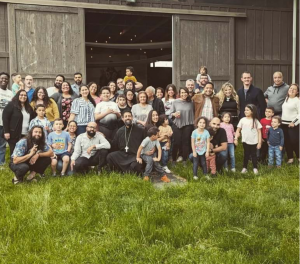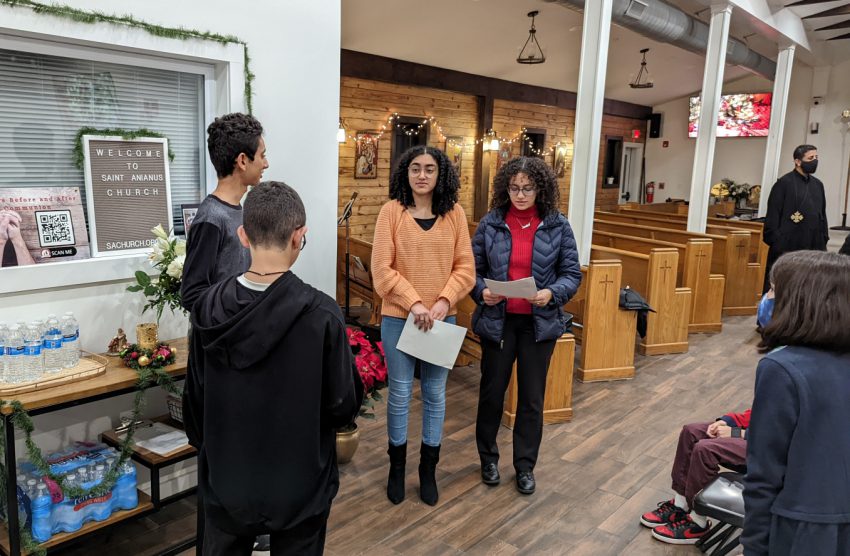At Pittsburgh Seminary, we seek to participate in God’s ongoing mission in the world by seeing and getting to know people as our neighbors. Challenged by Jesus’ parable of the Good Samaritan and inspired by (Mister) Fred Rogers ’62, who sang, “I have always wanted to have a neighbor just like you!”, I am writing this blog to introduce you to some of my neighbors, whom I want you to know. They are students in our Doctor of Ministry Program, for which I am honored to serve as the director. They work with diverse populations, whom they have come to see as neighbors and care for lovingly. I hope by the end of this series, you will get to know our Doctor of Ministry students, their ministries, as well as see those whom they serve as siblings in Christ, as neighbors near and far. Today, I’d like to introduce you to my neighbor Fr. Michael Sorial.
Father Sorial is a priest in the Coptic Orthodox Church. A son of Egyptian immigrants, he has lived all over the United States, including Michigan, Texas, California, Tennessee, New York, and New Jersey, where he currently lives with his wife, Mora, and children, Joseph, Grace, and Elijah. He is also a co-founder and chancellor of Agora University, a pioneering, global Orthodox Christian university dedicated to building bridges between Orthodox Christianity and the humanities to address the challenges of the contemporary world via distance learning. As part of the Eastern Christian Studies cohort in the D.Min. program at PTS, Fr. Michael is exploring the profound and formative narrative of the Great Commission as the inspiration of an ecclesiology that embodies a life of mission for his congregation to share the gospel with their neighbors.
– The Rev. Dr. Donna Giver-Johnston, Director of the Doctor of Ministry Program at Pittsburgh Theological Seminary
A Neighborhood of Healing

“Who are my neighbors?” I find myself looking not only to the houses next door or those who I meet at the local grocery store, but also at the faces of those in the pews at my parish. Within the walls of St. Anianus Coptic Orthodox Church, I have discovered a vibrant community of neighbors who embody the beauty of God’s image. My church family is comprised of individuals from diverse backgrounds, age groups, experiences, walks of life, and imperfections. Although approximately 70 percent of parish members are ethnically Egyptian, the other 30 percent are comprised of people who are Caucasian American, African American, El Salvadorian, Polish, Syrian, Jordanian, Italian, Lebanese, Sudanese, Indian, Puerto Rican, Pakistani, and Dominican. Unlike the people who live next door to my house, these neighbors have grown into more than just acquaintances; they have become companions on my journey of faith, each bearing the imprint of Christ in their unique way.

My neighbors have experienced profound suffering and adversity. Some have endured the pain of rejection, bullying, betrayal, divorce, financial hardship, infertility, or loss of a loved one. Many have expressed feeling utterly hopeless, with nowhere else to go. These deep wounds have left them emotionally scarred, spiritually depleted, and stripped of their sense of worth (Luke 10:30). In their attempt to cope, some have fallen prey to substance abuse or pornography. Yet, many of these individuals have encountered something transformative in the presence and actions of the Good Samaritan. Through the workings of God’s grace and mercy, they have found healing and restoration, reclaiming the likeness of Christ within themselves. In them, I see the marks of God’s healing work, which has resulted in lives embodied with love, compassion, and grace, qualities that reflect the life and teachings of Jesus, the Good Samaritan.
Becoming Good Samaritans
Through a life of union with God, my neighbors are in the process of becoming Good Samaritans themselves, actively striving to embody neighborliness. Within our parish, they are learning the importance of not ignoring a hurting, wounded neighbor’s needs (Luke 10:31-32). Whether it is offering a listening ear to a recent widow, helping circulate a resume for an unemployed father, giving a helping hand to a single mother during worship, or lifting each other up in prayer, they demonstrate a profound sense of neighborly care that goes beyond mere physical proximity.

My church community is not just a gathering of individuals; it is a fellowship united by a shared faith and common purpose. Together, we worship, learn, and grow in our relationship with God and each other. In this community of neighbors, we are also discovering the power of vulnerability, offering compassion, and encouraging one another. Although my parishioners have experienced deep wounds, they do not identify themselves as the sum of their wounds, sins, or struggles. Instead, they find their identity in Christ and the forgiveness, victory, and hope He offers. It is because of this that they, as wounded healers, have chosen to walk alongside each other, often unaware of just how profoundly they have shared Christ’s healing ointment with me, another neighbor they may not even realize is watching.
 Fr. Michael Sorial is a Doctor of Ministry student in the Eastern Christian Studies cohort at Pittsburgh Theological Seminary. He holds a master of letters from St. Andrews University and a certificate in theology and practice from the University of Winchester. He is co-founder and chancellor of Agora University, a pioneering, global Orthodox Christian University dedicated to building bridges between Orthodox Christianity and the humanities to address the challenges of the contemporary world via distance learning. Fr. Sorial is ordained in the Coptic Orthodox Church and serves as a parish priest at St. Anianus Church in New Jersey.
Fr. Michael Sorial is a Doctor of Ministry student in the Eastern Christian Studies cohort at Pittsburgh Theological Seminary. He holds a master of letters from St. Andrews University and a certificate in theology and practice from the University of Winchester. He is co-founder and chancellor of Agora University, a pioneering, global Orthodox Christian University dedicated to building bridges between Orthodox Christianity and the humanities to address the challenges of the contemporary world via distance learning. Fr. Sorial is ordained in the Coptic Orthodox Church and serves as a parish priest at St. Anianus Church in New Jersey.
Read Next



